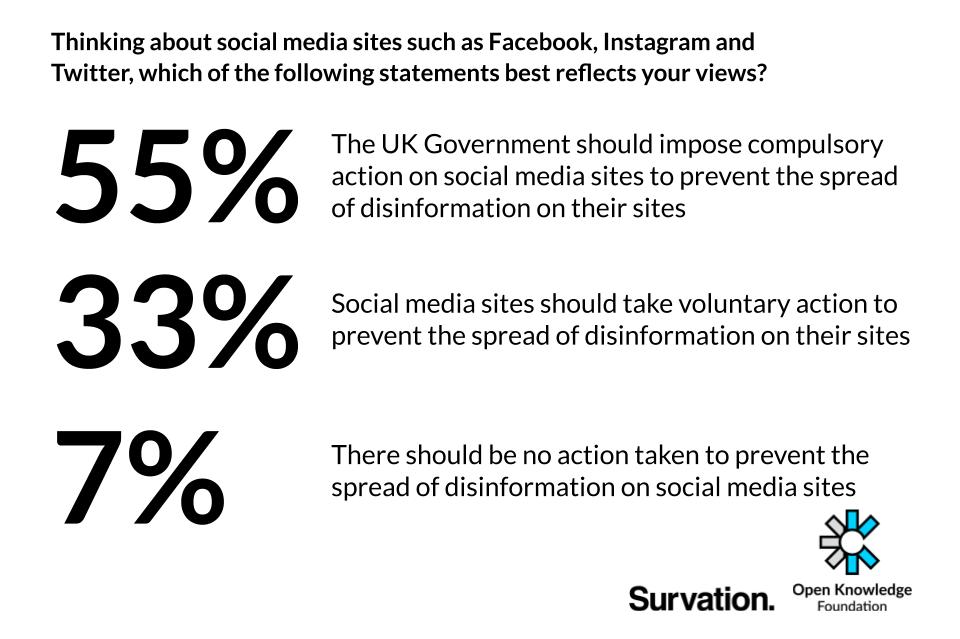A new opinion poll has revealed that a majority of people in the UK want ministers to take action against disinformation on social media sites.
The poll by Survation for the Open Knowledge Foundation found that 55 per cent of people in the UK believe the Government should ‘impose compulsory action on social media sites to prevent the spread of disinformation on their sites’.
One-third (33 per cent) said social media sites such as Facebook and Twitter should take voluntary action to tackle disinformation, and only 7 per cent said no action should be taken.
Over half of people (51 per cent) said they have seen content about COVID-19 they believe to be false or misleading.
One of the most common claims which has been discredited by medical experts is a link to 5G phone masts.
The poll also asked respondents about micro-targeting – the marketing strategy that uses people’s data to create small groups for targeting through adverts.
The results show that 43 per cent of people believe the UK Government should ‘impose compulsory action on internet platforms to restrict micro-targeting’, while 32 per cent believe internet platforms should take voluntary action to restrict micro-targeting. Only 10 per cent said no action should be taken.
Catherine Stihler, chief executive of the Open Knowledge Foundation, said: “The spread of fake news and disinformation on internet platforms has been ignored for too long, and now it is causing major concern during a global health emergency.
“It is sadly not surprising, and yet deeply worrying, that a majority of people in the UK have seen COVID-19 related information they believe to be false.
“The best way to tackle disinformation is to make information open, allowing journalists, scientists and researchers to provide facts to the public.
“Tech giants have a responsibility to increase transparency and work closely with fact checkers, but voluntary action is never going to be enough by itself.
“It’s encouraging that a majority of people in the UK want the UK Government to take action against social media platforms to prevent the spread of fake news.
“The UK Government should take account of these results and work towards a future that is fair, free and open.”
The Open Knowledge Foundation has been campaigning for greater openness amid concerns about micro-targeting.
Recent recommendations from the UK government advisory body on data technology include regulation of the online targeting systems that promote and recommend content like posts, videos and adverts.
But Facebook has refused calls for it to change its policies on fact-checking political adverts and limit micro-targeting.
Google previously said it is limiting political ads audience targeting to more general categories, and Twitter has banned political ads.
Catherine Stihler, chief executive of the Open Knowledge Foundation, said: “Restricting micro-targeting and tackling some forms of false information will help rebuild trust in the political process.
“But the long-term solution to this does not involve self-regulation. The only way to build a fair, free and open digital future in the UK and across the world is to update analogue laws for the digital age.”
Poll results
Opinion poll conducted by Survation on behalf of the Open Knowledge Foundation. Fieldwork conducted 27-28th April 2020, all residents aged 18+ living in UK, sample size 1,006 respondents. Download the full report. Tables available here.
Q. Disinformation is false information which is intended to mislead, including claims about COVID-19 which have been discredited by medical experts, such as a link to 5G phone masts. Have you seen any content about COVID-19 on social media sites such as Facebook, Instagram or Twitter that you believe to be false or misleading?
- Yes: 51%
- No: 37%
- Don’t know: 12%
Q. Thinking about social media sites such as Facebook, Instagram and Twitter, which of the following statements best reflects your views?
- There should be no action taken to prevent the spread of disinformation on social media sites: 7%.
- Social media sites should take voluntary action to prevent the spread of disinformation on their sites: 33%.
- The UK Government should impose compulsory action on social media sites to prevent the spread of disinformation on their sites: 55%.
- Don’t know: 5%.
Q. Micro-targeting is a marketing strategy that uses people’s data – about what they like, who they’re connected to, what they’ve purchased and more – to create small groups for targeting through adverts. It is commonly used by political parties and campaigns, as well as companies. Which of the following statements best reflects your views?
- There should be no action taken regarding the use of micro-targeting: 10%.
- Internet platforms should take voluntary action to restrict micro-targeting: 32%.
- The UK Government should impose compulsory action on internet platforms to restrict micro-targeting: 43%.
- Don’t know: 15%.
The official voice of the Open Knowledge Foundation.










